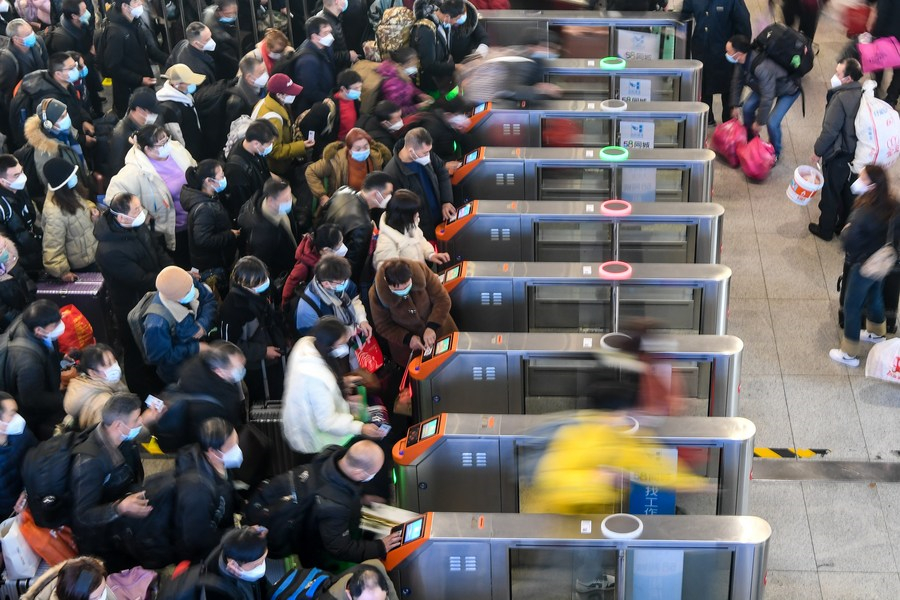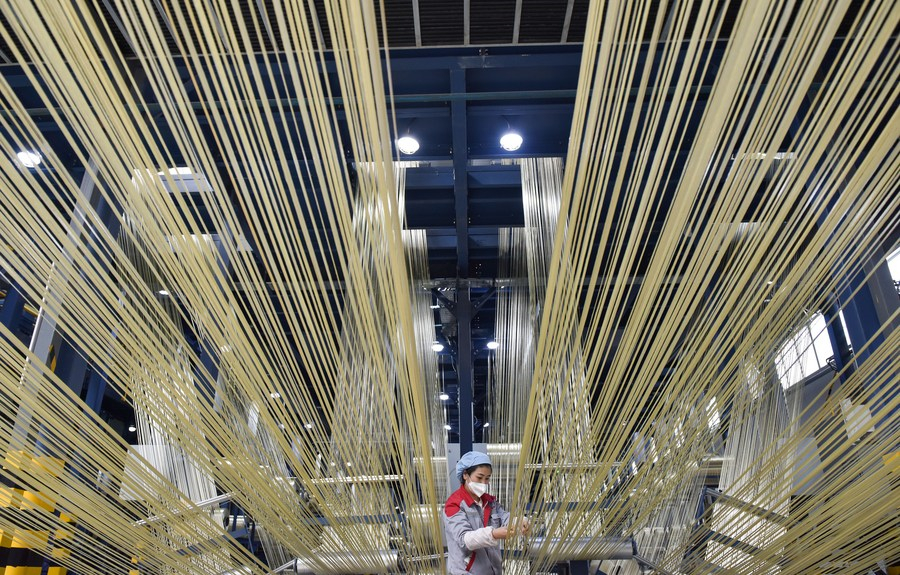China's economy starts 2023 with faster growth, stronger market confidence
* China's economy grew faster in the first quarter of 2023, with a strong service sector and robust consumption driving the rebound and market expectations improving significantly despite multiple challenges.
* China's gross domestic product (GDP) grew 4.5 percent year on year to 28.5 trillion yuan (about 4.14 trillion U.S. dollars) in the first three months.
* A recovery in the service sector, which contributed 69.5 percent to overall GDP growth in the first quarter, is a bright spot of the economic operations during this period.
* Looking ahead, the growth in the second quarter is likely to be significantly faster than in the first quarter.
BEIJING -- China's economy grew faster in the first quarter of 2023, with a strong service sector and robust consumption driving the rebound and market expectations improving significantly despite multiple challenges.

Consumers go shopping at a shopping mall in Kunming, southwest China's Yunnan Province, Jan. 1, 2023. [Photo by Liang Zhiqiang/Xinhua]
China's gross domestic product (GDP) grew 4.5 percent year on year to 28.5 trillion yuan (about 4.14 trillion U.S. dollars) in the first three months, data from the National Bureau of Statistics (NBS) showed Tuesday.
The pace accelerated from a 3-percent GDP growth for 2022 and a 2.9-percent increase in the fourth quarter of last year.
"China's national economy made a good start this year, and market expectations saw significant improvement," said NBS spokesperson Fu Linghui at a press conference.
"In the first quarter, China secured a smooth transition in COVID-19 prevention and control in a relatively short time," Fu said.
A recovery in the service sector, which contributed 69.5 percent to overall GDP growth in the first quarter, is a bright spot of the economic operations during this period, said Fu.
The value-added output of the service sector rose 5.4 percent year on year in the first three months, with rapid expansion in contact-based industries from travel to catering.
The accommodation and catering sector surged 13.6 percent year on year in the first quarter, in sharp contrast to a decline of 5.8 percent in the fourth quarter last year.

Passengers line up to enter Suzhou Railway Station in Suzhou, east China's Jiangsu Province, Jan. 7, 2023. [Xinhua/Li Bo]
Market vitality increased, with railway and air passenger volumes up 67.7 percent and 68.9 percent, respectively, in the first quarter compared to the same period in 2022.
Tuesday's data also showed retail sales of consumer goods went up 5.8 percent year on year in the first quarter, reversing a decline of 2.7 percent in the final quarter of last year.
"These improvements show domestic demand has gradually expanded and consumer expectations have improved," Fu said.
Lian Ping, the chief economist at Zhixin Investment Research Institute, said China's domestic consumption is the main growth driver, and consumption growth is expected to accelerate in the second quarter.

A staff member arranges raw filaments at a production base of Zhongfu Shenying Carbon Fiber Co., Ltd. in Xining, northwest China's Qinghai Province, Feb. 22, 2023. [Xinhua/Wu Gang]
Other data showed that the value-added industrial output increased by 3 percent year on year in the first three months, and fixed-asset investment went up 5.1 percent year on year in the first quarter, according to the NBS.
Looking ahead, Fu said growth in the second quarter is likely to be significantly faster than in the first quarter.
But due to high comparison bases, growth might be slower in the third and fourth quarters than in the second quarter, Fu said. The economic growth throughout the year will likely trend upward without considering the base effect.
China has set a GDP growth target of around 5 percent for 2023. The International Monetary Fund last week projected that China's economy would grow 5.2 percent in 2023.

This photo taken on Feb. 12, 2023 shows a night fair in Jinghong City of Xishuangbanna Dai Autonomous Prefecture, southwest China's Yunnan Province. [Xinhua/Chen Xinbo]
Fu said future growth would be underpinned by increased consumption and steady fixed asset investment. He pointed out that property sales witnessed positive changes in the first quarter, and property investment will likely stabilize gradually.
As for exports, Fu acknowledged that the country's foreign trade is under pressure, but he said China is likely to achieve the target of promoting stability and improving the quality of foreign trade throughout the year.
China's foreign trade expanded 4.8 percent year on year in the first quarter of 2023, reversing a decline of 0.8 percent in the first two months.
Although positive factors in China's economic operations kept accumulating, Fu cautioned that the foundation of the economic recovery is not solid yet.
He warned of difficulties and challenges for the Chinese economy, including a complex international environment, weakening global growth, inadequate domestic demand, and structural problems constraining China's development.
China will underscore efforts to pursue high-quality development, implement macro policies in a scientific and targeted manner, and strive to unleash the potential of domestic demand.
Video editors: Zhang Yucheng, Zhang Yuhong, Zhao Xiaoqing
The views don't necessarily reflect those of Qiushi Journal.
























